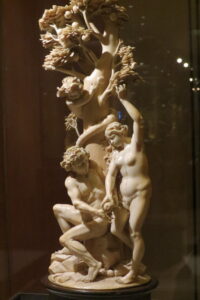RS26: Healing – The Gift of Love
A: Tell me what fearlessness meant for you during your ministry.
J: Good word. Fearlessness. Tricky word, too, because fearlessness for somebody who loves God isn’t the same experience as fearlessness for somebody who hates God. Psychopaths hate God, no matter what they say. Psychopaths also show a lack of normal fear, which is not to say they’re afraid of nothing, but that they’re afraid of very different things than non-psychopaths are.
Psychopaths aren’t afraid of hurting other people, aren’t afraid of taking huge physical and financial risks that would turn other people into quivering puddles of emotional jelly. On the other hand, psychopaths are terrified of dying a nameless death. They struggle against the reality of death, believe they can somehow circumvent it. When they realize the universe isn’t going to make a special exception for them, and give them the gift of physical immortality, they try to make themselves immortal anyway in a screw-you,-God,-I’ll-show-you-how-special-I-am demonstration of might and glory. So they focus all their efforts on “leaving a legacy.” A big legacy. A showy legacy. Something tangible. Something people can point to and ooh and ahh at — like a big temple. Or a statue commemorating his/her reign. Or a library with the family name plastered across the front. A psychopath is never content to be remembered for his kind heart and consistent ability to lift others up from within.
A: Blowing up buildings and massacring innocent people is pretty showy, too.
J: At the time, it seems like a good idea to the psychopath — a way to earn fame and glory. It doesn’t look that way to the victims, of course, but to the psychopaths, it’s good fodder for the history books.
A: You must have seen this mindset all around you in the early Roman empire you lived in. It wasn’t a pretty place for conquered peoples.
J: Yeah, go to your local arena and see enslaved animals and gladiators savage each other on the big screen of Real Life! Sick stuff.
A: Yet these displays of physical prowess were considered normal. Culturally acceptable.
J: Like slavery then and slavery later. Just because it’s culturally acceptable doesn’t make it right. The soul longs for freedom. The soul believes in freedom. Not libertarian freedom (the freedom to do whatever the hell you want, regardless of how it affects other people), but the freedom that comes with dignity and respect and egalitarianism. Balanced freedom, you could call it. The freedom to be considered a unique individual who is an important and worthy part of the larger community. The freedom to look your neighbour in the eye as an equal.
This is the kind of freedom that psychopaths always try to strip away from others.
A: So how does this relate to fearlessness?
J: It’s linked very strongly to free will. To free will and to trust. When the community you live in allows you to exercise your soul’s free will and your soul’s trust in God in the fullest possible way, you become, in your own unique way, a healer. Not a physician or surgeon or internist, but a healer. A person with a unique gift that brings some form of healing into the world and into the hearts and minds of those around you. There is no sphere of human existence where the inner impulse of fearlessness — trust and free will working together — shows itself more clearly than in the mysterious gift of healing.
A: By healing . . . do you mean what modern Western allopathic doctors mean by healing? Treating symptoms until the symptoms go away and “normal” function is restored?
J (shaking his head): No. By healing, I mean helping a person find a sense of wholeness, a sense of wholeness within themselves, a sense of worthiness within themselves that incorporates emotional worthiness, cognitive worthiness, physical worthiness, and spiritual worthiness. All these together. The whole enchilada.
Obviously there’s no point telling people they can find complete healing through pure physical worthiness or pure cognitive worthiness if in the next breath you’re going to tell them they’re full of Original Sin.
A: It’s amazing what can happen to a person’s physical symptoms when emotions and cognitive function and spiritual growth are treated with as much respect as the physical symptoms. (I speak from personal experience . . . )
J: Some Western physicians and health care professionals know this. But not enough of them. For a brief period in the twentieth century, Western physicians showed a strong blend “science and faith” in their healing relationships with patients. But today this common sense blend has been shoved out of the way and replaced by the technological model. It’s a pure Materialistic model, and, to be honest, I see no difference between the current allopathic medical model and the demon-model I fought against 2,000 years ago. Today’s obsessive-compulsive focus on “germs and genes” and “fighting germs and genes” is no different than yesterday’s obsessive-compulsive focus on “demons” and “fighting demons.” Both are attempts to control all the laws of Cause and Effect in the universe — laws which, in fact, no human being has the final say over.
A: When my beautiful son was battling leukemia — A.L.L. — he had little immune function for the first few months of his treatment, and then he had none at all after they blasted his body with radiation in preparation for a bone marrow transplant. Theoretically he shouldn’t have been able to fight off any pathogens. But theory got blown away by reality. In the nine months he lived between diagnosis and death, he suffered from many painful and frightening events (not least a massive stroke). But never once did he “get sick” from a cold or a flu or an infection of any kind.
When he was in hospital, he was in isolation. But after his bone marrow started to show faint signs of recovery, he was discharged from hospital and spent the summer at home. Our home wasn’t a sanitized and germ-free place. It was a normal home. I provided the nursing care for the central venous line that was still sticking out of his chest wall, and he never once got an infection at the entry site or in the line itself. He probably should have, but he didn’t. He was very disappointed, though, that he wasn’t allowed to eat fresh strawberries, which had been shown at the time to carry bacteria that could be harmful to immune-suppressed children. He loved strawberries.
J: Were you afraid while you were caring for your son?
A: Yes. I was terrified of his pain. Not terrified for me, but terrified for him. I recall with intense grief the days when he and I had to get through his spinal taps together without any pain medication at all. He was extraordinarily brave. He was so brave I couldn’t believe it. I couldn’t believe anyone could be so brave and so trusting of the people who were trying to help him.
J: Did your terror for him stop you from doing what needed to be done? Did it stop you from loving him and showing him your love?
A: No. I wasn’t afraid of the procedures. I understood what had to be done, and I wasn’t afraid of the science. I was afraid of the grief and the pain.
J: You were afraid of the grief and the pain, but you did it anyway. You and your husband made sure your son spent almost no time alone in the hospital room. Someone was always with him. You made sure his heart always felt safe, yes?
A: We did our best. Though Sick Kids Hospital wouldn’t let us stay with him overnight, which was very difficult for us. We had to stay at the Ronald McDonald House.
J: You could have” left the room” (emotionally speaking) and turned things over to “the science” or “the law,” as so many parents have done (not to their credit). But you didn’t. You believed you needed to be with him and look him in the eye and tell him you loved him. You knew he needed constant comfort.
A (nodding): My heart said he needed us.
J: Yes. He needed you. And you didn’t let him down. This is what fearlessness feels like. It’s not lack of fear in the face of illness and death. It’s the choice to choose love and trust even when you feel the fear. It’s the choice to do the right thing for somebody else’s healing. For somebody else’s sense of worthiness and wholeness. For somebody else’s discovery deep within that the mystery of love cannot be contained. It’s too big to ever be held back by small rooms and the petty concerns of Law. It fills up the smallest cracks of Creation with its wondrous powers of growth and healing and expansion. It grows and grows within, even when the physical body itself is dying.
This is the gift of one human being to another, a gift that is eternal.
All human beings have this power within their hearts if they choose to claim it.













